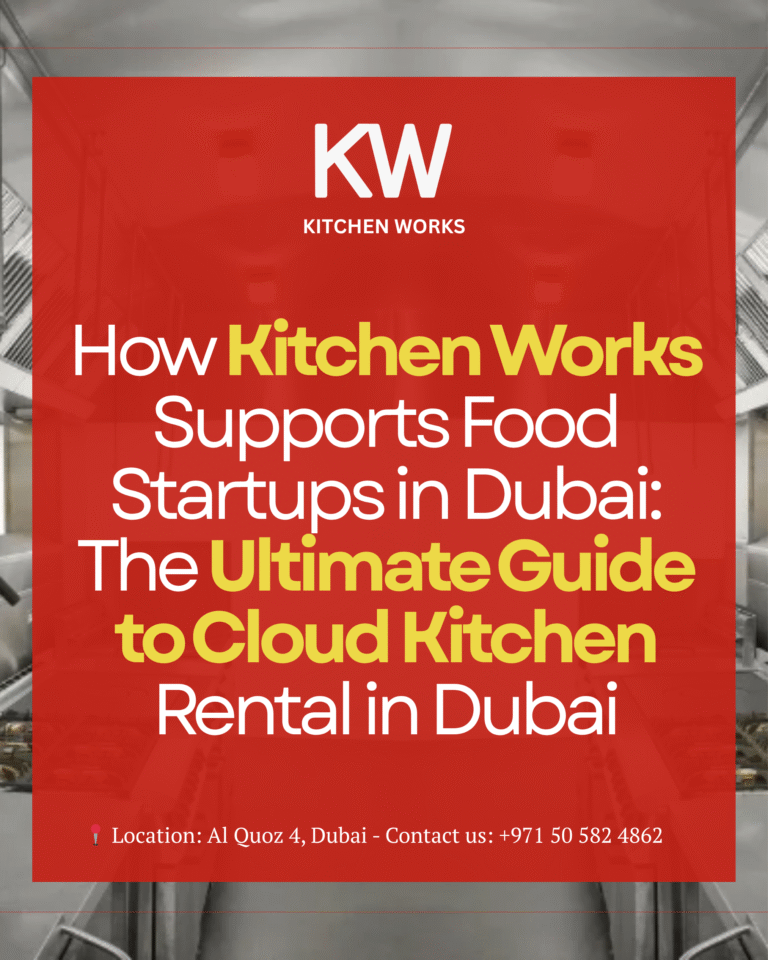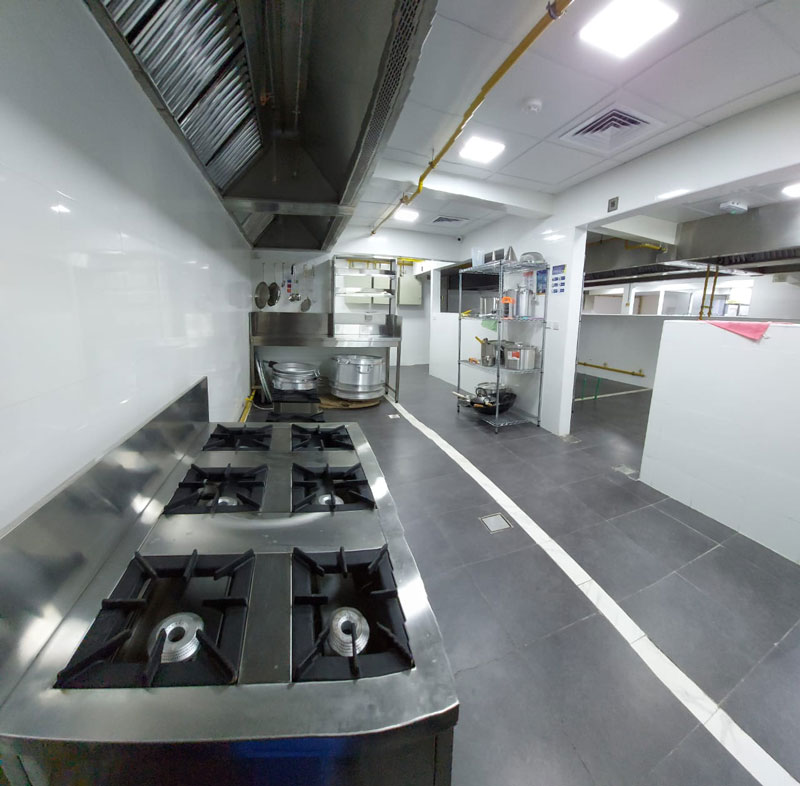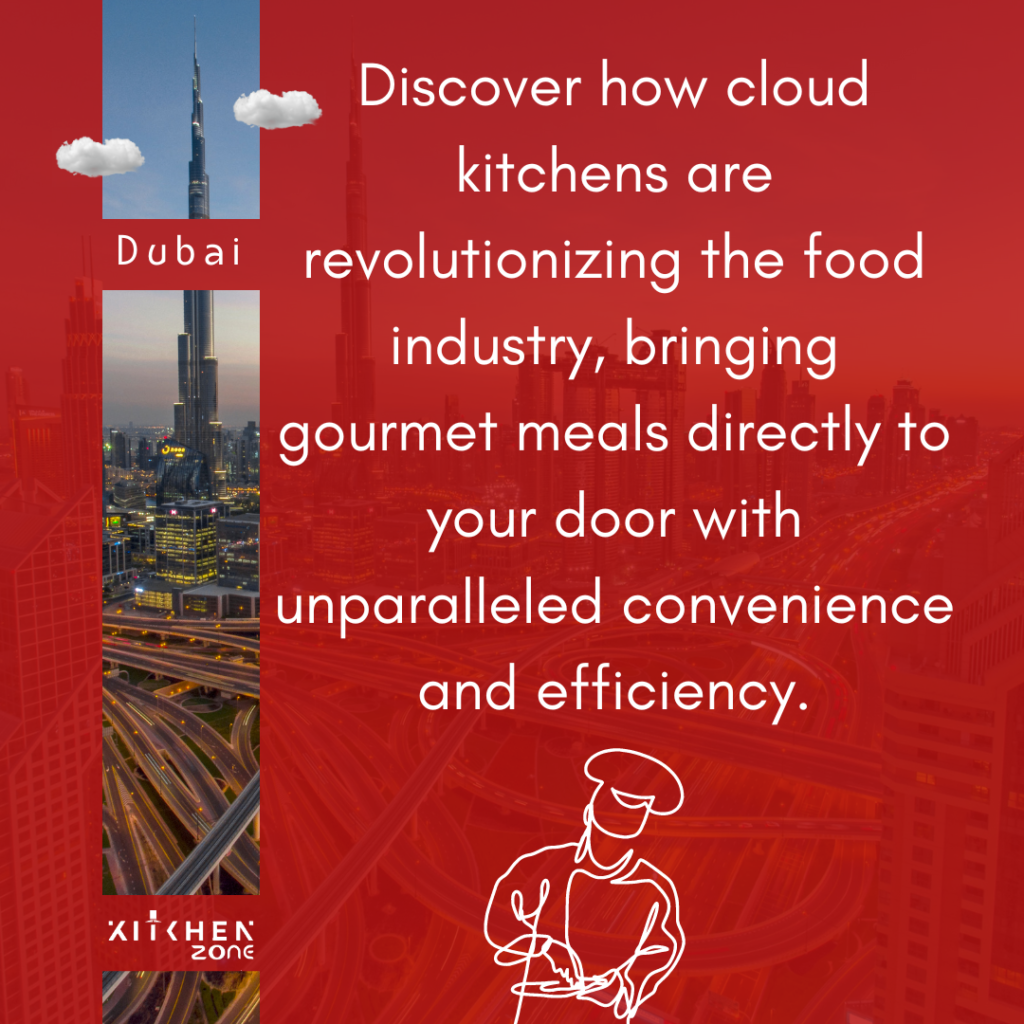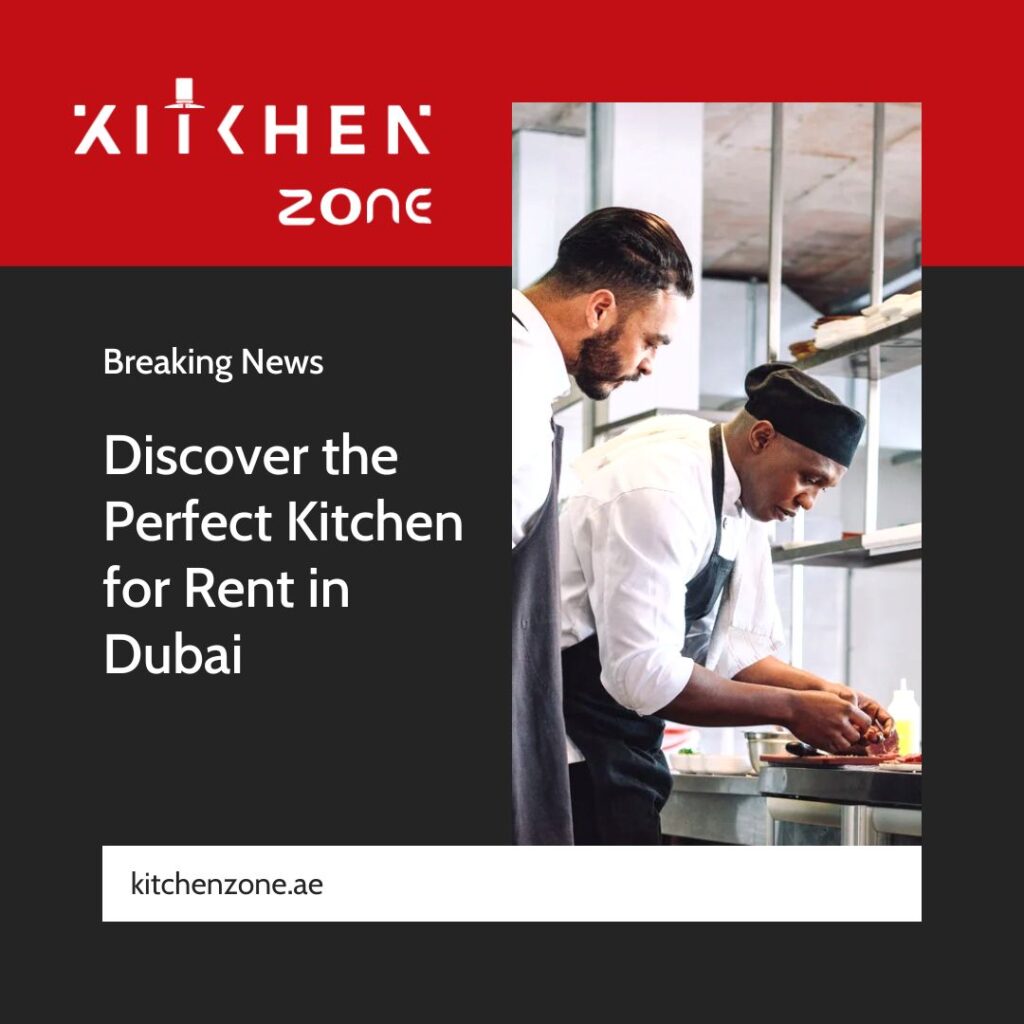Table of Contents
- How Kitchen Works Supports Food Startups in Dubai
- What Is a Cloud Kitchen & Why It Matters
- The Challenges Food Startups Face in Dubai
- Introducing How Kitchen Works
- Cloud Kitchen Rental in Dubai with How Kitchen Works
- Step-by-Step: Launching via How Kitchen Works
- Tips for Choosing the Right Cloud Kitchen Rental in Dubai
- Future of Food Startups & Cloud Kitchens in Dubai
- Conclusion & Next Steps for Dubai Food Entrepreneurs
- FAQ’s
How Kitchen Works Supports Food Startups in Dubai
Introduction: Why Food Startups Need Support
Dubai’s culinary scene is booming. Every year, new food brands emerge — from healthy meal plans to niche ethnic cuisine delivered via apps. But behind the scenes, aspiring food entrepreneurs face a labyrinth of challenges: high real estate costs, regulatory red tape, logistics nightmares, and the constant pressure of digital visibility. The demand for cloud kitchen rental in Dubai has grown rapidly as more entrepreneurs enter the food delivery industry.
Enter the concept of cloud kitchen rental in Dubai, a model that allows startups to leapfrog many early-stage hurdles. Choosing the right cloud kitchen rental in Dubai is the first step toward building a successful online food brand. By renting production space (a “cloud kitchen”) instead of investing in a full dine-in restaurant or private facility, food entrepreneurs can reduce their capital burden and launch faster. But not all cloud kitchens are created equal — what really matters is support infrastructure, scalability, tech, and a partner you trust.
What Is a Cloud Kitchen & Why It Matters
Definition and Core Concept
A cloud kitchen (also known as ghost kitchen, dark kitchen, virtual kitchen) is a fully equipped facility used solely for food production and delivery — no dine-in or front-of-house services. In essence, it’s a behind-the-scenes kitchen optimized for delivery and pickup orders. Because customers never visit, the design, layout, and operations are tailored to efficiency, speed, and multi-brand capacities.
Difference Between Traditional Kitchens and Cloud Kitchens
Here’s how the two compare:
| Feature | Traditional Kitchen / Restaurant | Cloud Kitchen |
|---|---|---|
| Front-of-house & ambiance | Yes, large portion of cost | None (no customer seating) |
| Location priority | Prime foot traffic | Delivery coverage more important |
| Capital expenditure | High (furniture, decor, staffing) | Lower (kitchens only) |
| Operational focus | Both service & kitchen | Purely kitchen & delivery logistics |
| Scalability | Each new branch needs full setup | Can spin up multiple brands in same facility |
Cloud kitchens allow multiple brands or menus to co-exist under one facility with shared utilities, enabling higher utilization and lower marginal cost per brand.
Market Trends in Dubai & UAE
Dubai is a fertile ground for cloud kitchens. With a high smartphone penetration, widespread food delivery adoption, and a young, cosmopolitan population, the demand is strong. During COVID-19, delivery surged, and many food brands realized they could operate without a storefront. Local trends show:
- Increased investments in ghost kitchen platforms across GCC
- Consumer preference shift to convenience, meal kits, virtual brands
- Integration of online ordering, delivery apps, and in-house logistics
Thus, “cloud kitchen rental in Dubai” is not just a niche term — it’s a fast-rising category businesses are actively searching for. Optimizing content around that phrase helps capture startup founders, investors, and researchers all exploring cloud kitchens in Dubai.
The Challenges Food Startups Face in Dubai
High Overheads (Rent, Utilities, Staff)
Dubai real estate is costly, especially in prime commercial zones. For a food startup to secure a kitchen in a central location with high footfall, costs skyrocket. On top of rent, there’s power, cooling, gas, water, maintenance, staffing, and waste disposal. Traditional setups require large upfront capital, working capital, and long leases — all major barriers for first-time founders.
Regulatory & Licensing Hurdles
Food regulation in Dubai is stringent (for good reason). Companies must comply with food safety standards (Dubai Municipality, food establishment permits), health inspections, HACCP or similar certifications, halal certs, labeling, and more. Navigating the documentation, applying, and maintaining compliance is time-consuming and intricate — and many small food brands don’t have in-house compliance teams.
Logistics, Delivery & Supply Chain Issues
Getting fresh ingredients daily, storing them in correct conditions, managing inventory, coordinating last-mile delivery — the logistics puzzle is complex. Many startups struggle to build relationships with suppliers, negotiate bulk buying, manage spoilage, and ensure timely deliveries to customers.
Plus, integration into delivery platforms (Talabat, Deliveroo, Zomato, etc.) requires technical setup, menu management, API integration, and consistent order fulfillment.
Together, these challenges make launching a food startup in Dubai a risky venture unless supported by a partner with infrastructure, systems, and experience.
Introducing How Kitchen Works
Company Vision and Mission
How Kitchen Works aims to lower the barrier to entry for food entrepreneurs in Dubai. Their mission: empower food startups with ready-to-use infrastructure, operational support, and growth tools — so founders can focus on creativity, recipes, brand, and customer delight rather than ovens, permits, and logistics. Kitchen Works provides fully equipped spaces for cloud kitchen rental in Dubai, tailored to meet every business need.
They position themselves not just as a real estate provider, but as a food startup enabler, facilitator, and growth partner.
Services Offered
How Kitchen Works offers a full stack of services:
- Cloud kitchen rental in Dubai (shared or dedicated)
- Fully fitted kitchen stations with commercial equipment
- Utilities, cleaning, maintenance
- Cold rooms, dry storage, pantry management
- Regulatory & compliance assistance (licensing, audits)
- Order management & aggregator integration
- Delivery & logistics partnerships
- Marketing, SEO, digital services
- Analytics, performance dashboards, training
By bundling these, they aim to reduce friction for food founders.
Facilities and Infrastructure
Kitchen Works helps you simplify your setup process with affordable cloud kitchen rental in Dubai options.
Their facilities in key Dubai zones are built to high standards: industrial ventilation, proper exhaust systems, pest control, hygiene certification, fire safety, staff lockers, wash stations, waste disposal. They segment kitchens by brand size, production volume, and use smart zoning so multiple brands don’t cross-contaminate.
Cloud Kitchen Rental in Dubai with How Kitchen Works
How Their Rental Model Works
How Kitchen Works offers flexible rental options: shared kitchen stations (for small-scale brands), dedicated pods (medium scale), or full bespoke kitchens for high-volume brands. The idea: scale as you grow. You don’t need to commit to a 5-year lease — you can start with a few stations, test viability, and scale up.
The rental model often includes a base fee (rent + utilities) plus a percentage or markup on services (cleaning, utilities overages, packaging, logistics). Because of economies of scale, How Kitchen Works can negotiate bulk rates on utilities and services and pass savings to tenants.
Pricing and Packages
Packages typically fall into tiers:
- Starter Plan: entry-level station, minimal hours per week
- Growth Plan: higher station access, storage, extended hours, basic marketing support
- Enterprise / Scale Plan: dedicated area, priority scheduling, premium services (delivery, analytics, branding)
Features Included (Equipment, Utilities, Storage, Support)
Every package generally bundles:
- Commercial-grade cooking equipment (ovens, stoves, fryers)
- Refrigeration, cold rooms
- Dry storage & pantry
- Ventilation, fire safety, HVAC
- Cleaning services, pest control
- Utility consumption (gas, electricity, water)
- Shared support staff, maintenance
- Compliance & audit support
- Shared packaging & labeling facilities
- Connectivity (internet, POS terminals)
- Tech integration with delivery platforms
So a founder doesn’t worry about buying ovens or installing exhaust systems — everything comes ready.
Step-by-Step: Launching via How Kitchen Works
Application & Onboarding Process
- Inquiry & Consultation — You approach How Kitchen Works with your concept, menu, forecast.
- Selection & Proposal — They propose a location, station size, and package.
- Due Diligence & Compliance — Submit required docs (food safety, trade license, etc.), perform site visits.
- Agreement & Deposit — Sign lease / rental agreement, pay deposit.
- Kitchen Allocation & Setup — They assign you a station, help you bring in your ingredients, packaging.
- Training & Systems Integration — Staff are trained, your menu and POS gets integrated, order pipelines tested.
It’s designed to be swift (often within weeks) compared to standalone buildouts.
Kitchen Setup, Training & Launch
At launch, the team tests your first orders, checks workflow, monitors quality, ensures compliance. Kitchen staff and founders collaborate to refine timings, packaging, delivery routing, order previews, customer feedback loops.
Once stable, your brand begins live operations via delivery apps and your direct channels.
Scaling and Expansion
As demand grows, you can:
- Expand to more stations or pods in same facility
- Move to a dedicated kitchen or area
- Add new menus or virtual brands
- Expand to other How Kitchen Works locations across Dubai
- Use their analytics and growth tools to optimize menu, pricing, delivery zones
This modular scalability is key — you don’t outgrow them, you scale with them.
Tips for Choosing the Right Cloud Kitchen Rental in Dubai
Location, Accessibility, Delivery Radius
Choose a facility that gives you coverage for your target delivery zone. Proximity to residential clusters and logistic hubs matters more than prime retail presence.
Equipment, Hygiene, Flexibility
Check that the kitchen has quality, well-maintained equipment, rigorous hygiene standards, proper ventilation, pest control, and capacity to upgrade. Flexibility to adjust station size is a plus.
Support Services, Tech Stack, Transparency
Ensure the provider offers full support — compliance, marketing, logistics, analytics — and has a transparent pricing model without hidden costs. A good tech stack (order management, dashboards) is a must.
Doing your homework (site visit, asking for sample tenants, reading contracts) goes a long way.
Future of Food Startups & Cloud Kitchens in Dubai
Trends: Ghost Kitchens, AI-Driven Operations
AI and predictive analytics will optimize ingredient ordering, menu mix, dynamic pricing, and delivery routing. Ghost kitchens will evolve into smart hubs with robotics and automated prep. Cloud kitchens will be core infrastructure for the next wave of digital food brands.
Role of Sustainability, Dark Kitchens
Sustainable packaging, zero-waste models, shared cold chain, and renewable energy (solar kitchens) will differentiate brands. Dark kitchens (no human cooks, robotics) may also emerge in limited capacities.
How Kitchen Works’ Growth Roadmap
How Kitchen Works is likely to expand into more zones, suburban areas, even across the UAE. They might specialize in cloud kitchens for niche segments: healthy, vegan, ethnic, gourmet. They may build co-warehousing, distribution hubs, or platform-level marketplaces linking microbrands across kitchens.
By partnering with KitchenWorks, you can find the best cloud kitchen rental in Dubai for your business goals.
Conclusion & Next Steps for Dubai Food Entrepreneurs
If you’re a foodpreneur in Dubai with ambition but limited capital, cloud kitchen rental in Dubai offers a low-risk, scalable pathway. And when you choose a partner like How Kitchen Works, you don’t just rent a kitchen — you gain a support ecosystem: operations, compliance, logistics, marketing, tech, and expansion infrastructure.
Start by reaching out to them for consultation, assess your menu and forecast, compare their packages, and see whether their coverage matches your target delivery zone. Use the tips above to vet transparency, tech, support, and flexibility.
With that foundation, you can launch swiftly, adapt, and scale — transforming a kitchen station into a thriving food brand in Dubai’s dynamic ecosystem.
Ready to scale your food business? Explore our modern spaces for cloud kitchen rental in Dubai today.
FAQ
- How soon can I start operations once I join How Kitchen Works?
Typically within 2–4 weeks from documentation to launch, depending on setup, compliance, and menu testing. - Can multiple brands share one cloud kitchen under How Kitchen Works?
Yes — many startups launch multiple virtual brands under one station to diversify revenue and test new ideas. - What is included in a cloud kitchen package?
Equipment, utilities, storage, cleaning, compliance, order integration, and sometimes marketing & logistics. - Do I need a food license before I apply?
Some licensing groundwork is required, but How Kitchen Works can guide you through regulatory compliance and approvals. - Is cloud kitchen rental in Dubai profitable long-term?
Yes — when volume, operational efficiency, digital reach, and cost control converge, cloud kitchens provide leaner margins and faster scaling than traditional restaurants.





